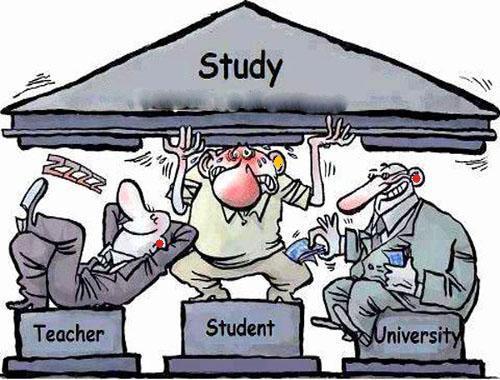Trustees Education
Trustees Education – Clueless Governance: The Public Agenda Report
Trustees Education – DEC 9, 2015 @ 12:00 PM
Trustees Education – The Public Agenda (a nonpartisan organization that provides useful perspectives on public policy issues) has issued a great new report on university governance, A Difficult Balance: Trustees Speaking About the Challenges Facing Comprehensive Universities.
Trustees are potentially key agents in bringing about higher education reform. They have two unique characteristics: first, they are part of both university communities and also the broader public that largely funds higher education (board members are not paid by universities and typically hold jobs outside higher education, but they also meet regularly on campuses and have institutional responsibilities and loyalty). This means they can provide university communities with too often neglected perspective of the “real world” existing off campus. Second, they have enormous clout if they wish to use it – they have the power to make important university decisions – everything from hiring and firing presidents, to setting tuition fees, authorizing new buildings or approving additional areas of instruction and research.
The Public Agenda interviewed at depth 42 university trustees on some 29 boards with responsibilities over 143 comprehensive universities (these are public schools that are not flagship research universities; some trustees oversee multiple institutions). They also talked to 45 university presidents. The interviews were frank and interviewees assured confidentiality. The report is over 60 pages long, obtainable through the Public Agenda web site (publicagenda.org), so this commentary just touches on a few highlights.
The single biggest takeaway I got from the report is that often trustees feel clueless. They get tons of information dumped on them by university presidents shortly before board meetings, but much of it is technical and dealing with minute, specific issues on which the trustee has little knowledge. The information is one-sided, presenting just what the administration wants the board to hear. As one board member put it (p.18), “There’s inevitably a certain amount of spin…It’s very, very hard for the board to get accurate information about the decisions we have to make. It’s the biggest shortcoming of the board that we don’t have a professional staff capable of analysis that works just for us. We have only the staff of the system, which is the entity that is asking us to make the decision about them.”
Another trustee put it more colorfully: “The staff likes to treat you like mushrooms: keep you in the dark and shovel you manure….The inmates shouldn’t run the prison.” Still another opined, “A lot of times boards are left making small choices, it’s all small…because of the bigger issues, the control is retained by the institutions because of the…hurdles that have been woven around discussion of those issues….” Still another commented, “We pretty much rubber stamp 95 percent of what the staff brings.” Exactly, amen.
I have been saying these things for years: university trustees should have at least one staff person who has complete, unfettered access to any information that the university president has available, and should be completely separate from the university administration – physically located not in the president’s office, and with compensation decided by the board. These independent staffers ideally would provide trustees with information suppressed from the public because it is embarrassing (e.g., critical comments in accreditor reports, high fees to university investment managers relative to those at other universities, a scandal involving a senior administrator that the president wants hidden). They would share opinions from faculty leaders or from student groups. If there is a critical editorial in the student or local newspaper, a copy of it might well be provided to the trustees. Perhaps the trustee staff person would send a weekly update on campus affairs to his bosses.
As the title of the report suggests, there are tradeoffs involved – trustees should not be left in the dark and be considered merely cheerleaders with a ceremonial governance role similar to that of the Queen of England, but also it is counterproductive if they interfere daily with suggestions about matters of routine administration – who the new football coach should be, for example. University presidents are hired to run the university, and some of them are frustrated at times by board interference. But more often, as one president stated about his trustees, “They don’t engage. I suppose it gives me greater freedom of action.” Some presidents, however, find boards annoying; as one stated “most presidents…find it to be an inconvenient annoyance that they have a board. The president is a CEO and they don’t need a board. But they’ve got one and have to figure out what to do with it.” That sort of presidential arrogance is precisely the reason we need boards, in my judgment.
Trustees Education –Read the entire article, here
==================================================================
To Discuss how these Solutions will add value for you, your organization and/or your clients, Affinity/Resale Opportunities, and/or Collaborative Efforts, Please Contact:
Tom McDonald, tsm@centurytel.net; 608-788-5144; Skype: tsmw5752 

